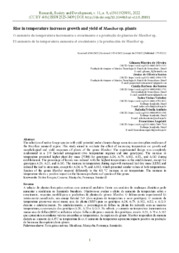Rise in temperature increases growth and yield of Manihot sp. plants.
Rise in temperature increases growth and yield of Manihot sp. plants.
Autoria: OLIVEIRA, G. M. de; SANTOS, J. de O.; SANTOS, C. B. dos; VOLTOLINI, T. V.; ANTONIO, R. P.; ANGELOTTI, F.
Resumo: The selection of native forage species with yield potential under climate change scenarios can strengthen resilience of the Brazilian semiarid region. This study aimed to evaluate the effect of increasing temperature on growth and morphological and yield responses of plants of the genus Manihot. The experimental design was completely randomized in a 2×9 factorial arrangement (two temperature regimes and nine genotypes). The increase in temperature promoted higher plant dry mass (PDM) for genotypes A:24, A:79, A:102, A:EL, and A:GO during establishment. The percentage of leaves was reduced with the highest temperatures in the establishment, except for genotypes A:20, A:21, and A:GO. The increase in temperature during regrowth increased leaf dry mass (LDM) and reduced the leaf to stem ratio, except for A:24, A:79, and A:102, which presented similar values at both temperatures. Species of the genus Manihot respond differently to the 4.8 °C increase in air temperature. The increase in temperature shows a positive impact on the biomass production of species of this genus.
Ano de publicação: 2022
Tipo de publicação: Artigo de periódico
Unidade: Embrapa Semiárido
Palavras-chave: Aumento da temperatura, Biomassa, Cassava, Forage, Forrageiras nativass, Forragem, Mandioca, Manihot, Maniçoba, Planta Forrageira, Pornunça, Semiárido
Observações
1 - Por padrão são exibidas publicações dos últimos 20 anos. Para encontrar publicações mais antigas, configure o filtro ano de publicação, colocando o ano a partir do qual você deseja encontrar publicações. O filtro está na coluna da esquerda na busca acima.
2 - Para ler algumas publicações da Embrapa (apenas as que estão em formato ePub), é necessário ter, no celular ou computador, um desses softwares gratuitos. Sistemas Android: Google Play Livros; IOS: iBooks; Windows e Linux: software Calibre.
Acesse outras publicações
Acesse a Base de Dados da Pesquisa Agropecuária (BDPA) para consultar o acervo completo das bibliotecas da Embrapa.

